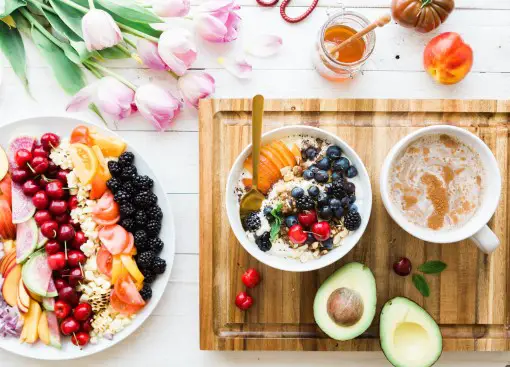
Foods that help sleep apnea – 5 to try for better sleep
By Jason Wooden, PhD
The link between food and sleep apnea has not been well studied, but there are foods with useful health benefits that can help support your sleep apnea treatment.
In this article, we’ll talk about the 5 sleep promoting food types, anti-inflammatory foods that may help sleep apnea, foods and habits to avoid, and healthy bedtime snacks.
“Tell me what you eat and I will tell you what you are.”
– Anthelme Brillat-Savarin, 1826
“Tell me what you eat and I will tell you what you are.”
– Anthelme Brillat-Savarin, 1826
“Tell me what you eat and I will tell you what you are.”
– Anthelme Brillat-Savarin, 1826
A) Why what you eat matters for sleep apnea
With the huge interest in natural solutions for health issues, it’s no surprise people are wondering about foods that help sleep apnea.
Living with sleep apnea can be a pretty miserable experience.
The nightly breathing interruptions are bad enough as they keep you from getting deep restful sleep.
For some, things are even worse if you have a hard time falling asleep in the first place.
Your sleep apnea treatment will help you have fewer interruptions and get more restful sleep, but you also need to do whatever you can to fall asleep more timely.
Sleeping pills have definite downsides, so natural solutions are worth a try. Your options include calming music, meditation, yoga, herbal supplements, and other natural remedies.
Which brings us back to food…
Okay, specific foods and diets have been found to help with many health conditions, but here’s the catch – the connection between food and sleep apnea has not been well studied.
And there’s not much evidence that foods can directly help sleep apnea.
On the other hand, some foods do contain nutrients that promote healthy sleep which can be a nice complement to your sleep apnea treatment.
And other foods have anti-inflammatory effects that may help with sleep apnea.
Also, keep in mind that what you eat, especially at night, can help make it easier to fall asleep and stay asleep. And we now know that when and how you eat is important.
A good rule is to avoid foods that hurt sleep and eat foods loaded with nutrients that help.
In this article we’ll talk about both.
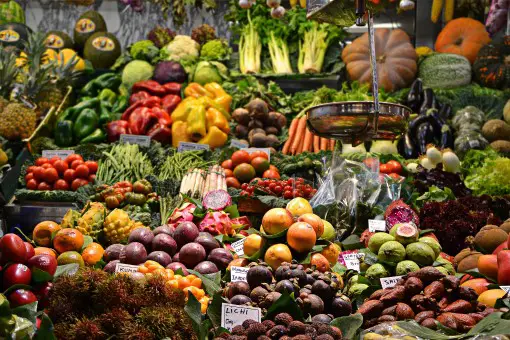
B) Foods that help sleep
We now know quite a bit about what’s in our food and how it affects health.
There has been a lot of buzz about micronutrients – vitamins, minerals, antioxidants, phytochemicals, and other substances found in food.
(We’re all familiar with the macronutrients – carbs, fats, and proteins.)
Micronutrients have been linked to wide variety of health benefits and some promote healthy sleep.
The micronutrient food-types good for sleep include:
1. Melatonin-Rich Foods
Melatonin is the hormone that tells your body its time to sleep. It’s tied into the body’s sleep/wake cycle, increasing when its dark and decreasing when it’s light.
It tends to drop as you age and melatonin supplements have become popular.
What to try:
Fruits – cherries, pomegranate, grapes
Vegetables – corn, asparagus, tomatoes, olives, grapes, broccoli, cucumber
Grains – rice, barley, oats
Nuts and seeds – walnuts, peanuts, sunflower seeds, mustard seeds, flax seed
More about melatonin and sleep
2. Tryptophan-Rich Foods
Tryptophan is one of the many amino acids found in protein. In the body, it can be turned into the neurotransmitter serotonin which is then used to make melatonin.
In studies, dietary tryptophan intake has been linked to sleep duration and tryptophan supplementation has been found to improve sleep.
What to try:
Diary – milk, yogurt
Fruits – apples, bananas, peaches, avocado
Vegetables – spinach, broccoli, turnip greens, asparagus, onions, seaweed
Legumes – kidney beans, lima beans, black beans, split peas, chickpeas
Meats – chicken, seafood
Nuts and seeds – walnuts, peanuts, sunflower seeds, mustard seeds, flax seed
More about tryptophan and sleep
3. Calcium-Rich Foods
Calcium is a mineral used by the body for many different things. In the brain, it helps the body make melatonin from tryptophan.
Did you know that calcium intake has been associated with poor sleep? Calcium rich diets have been shown to help patients with insomnia.
What to try:
Diary – milk, cheese, yogurt
Fruits – apples, bananas, peaches, avocado
Vegetables – dark leafy greens, green snap peas, okra, broccoli
Legumes – soybeans
Meats – sardines
4. Magnesium-Rich Foods
Magnesium is a mineral used by the body for many biochemical reactions and supports biological functions like the immune system. It’s also important for sleep and acts as a natural relaxant to help deactivate adrenaline.
In a 2012 clinical study, magnesium supplementation was found to improve sleep.
What to try:
Diary – yogurt
Fruits – avocados, bananas,
Vegetables – leafy greens
Legumes – soybeans
Meats – fish
Nuts and seeds – almonds, sunflower seeds, Brazil nuts, cashews, flax seed, pecans
Whole grains
More about magnesium and sleep
5. Vitamin B-Rich Foods
The B-complex vitamins help make energy out of food. They also play a role in moods and sleep.
In one study, deficiencies in vitamin B-6 were linked to depression and poor sleep. In another, lower consumption of dietary B-6 was tied to insomnia.
What to try:
Diary – eggs, milk, cheese, yogurt
Fruits – avocados, bananas, citrus fruits
Vegetables – leafy greens, spinach, broccoli, turnip greens, asparagus, onions, seaweed
Legumes – beans, lentils, chickpeas, green peas, kidney beans, pinto beans, lima beans, black beans, split peas, chickpeas
Meats – fish, chicken, pork, red meat
Nuts and seeds
Whole grains
C) Foods that may help your sleep apnea
So far, we’ve talked about the foods that can help promote sleep.
Let’s now take a look at the foods that may more directly help with sleep apnea symptoms.
You’re probably aware of the most common sleep apnea symptoms – fatigue, snoring, headaches, and high blood pressure.
Did you know that sleep apnea has also been connected to inflammation?
To be clear, inflammation is important – it’s how your body mobilizes the immune system to fight foreign invaders such as bacteria and viruses.
It’s also important to the healing process.
However, when it happens for too long, inflammation can actually HARM the body…
Inflammation has been found to play a role in many health conditions, so it’s no surprise researchers have found a link to sleep apnea.
Patients with obstructive sleep apnea, the most common sleep apnea type, have upper airway and systemic inflammation.
In fact, in studies sleep apnea severity has been found to correlate with high levels of inflammation – the worse your sleep apnea is the more inflammation found in the body.
Anti-inflammatory diets have grown in popularity as a natural way to help the body heal.
They focus on foods to avoid:
- Sugary drinks, snacks, and desserts
- Refined carbs (white bread, white pasta)
- Processed meats and foods
- Processed soybean and corn oils
- Trans fats
- Excessive alcohol
And foods to eat more of:
- Fruits and vegetables
- Healthy fats (olive oil, coconut oil)
- Fatty fish
- Nuts
- Spices such as turmeric and cinnamon
There are specific foods that have been shown to reduce inflammation in the body, but none have been directly tested in sleep apnea patients. This is simply another area that hasn’t been well researched.
And for some of these foods, you may need a supplement in order to get a medicinal dose. (If you decide to do this, be sure to talk to a herbalist or naturopathic physician about the best form and dose. You can find one here.)
On the other hand, you may just be simply looking for foods to add to your regular diet that have nutrients that may help with your sleep apnea.
If that’s the case, here are the ones that have been shown to be anti-inflammatory:
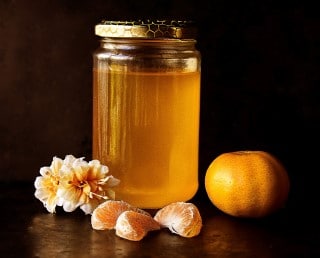
Honey
Benefits: anti-inflammatory, anti-oxidant
Evidence: clinical studies
Learn more
Recipes with honey
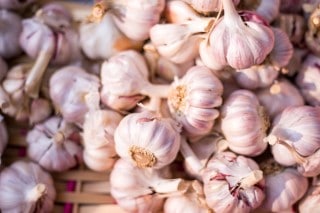
Garlic
Benefits: anti-inflammatory, anti-oxidant
Evidence: clinical studies
Learn more
Ideas to add more garlic to your diet

Turmeric
Benefits: anti-inflammatory
Evidence: clinical studies
Learn more
Healthy recipes that use turmeric

Peppermint
Benefits: anti-inflammatory
Evidence: animal studies
Learn more
Healthy mint recipes
D) Avoid these food habits if you have sleep apnea
We’ve talked quite a bit about foods that can help if you have sleep apnea, including foods that may reduce inflammation in the body.
It’s also important to think about food habits – they can really make things worse.
And its not just what you eat, but how and when you eat too.
Generally, it’s a good idea to avoid foods in the evening that interfere with the body’s natural sleep cycle and keep you awake.
Yes, that includes the obvious, coffee and tea. (You can read here about how caffeine becomes a bigger deal as you get older.)
You should also stay away from foods that can aggravate your sleep apnea symptoms, especially anything that can worsen the acid reflux and heartburn many sleep apnea patients deal with.
Here’s what you need to avoid:
Caffeinated beverages, foods – can keep you WIDE awake!
Rich or spicy foods – may keep you up with heartburn, can also aggravate your throat
Alcohol – may help you fall asleep initially, but can keep you from having deep restful sleep; alcohol can also relax your throat and increase your risk for sleep apnea
Eating too late or too much – may keep you up with indigestion
Some simple healthy bed time snacks…
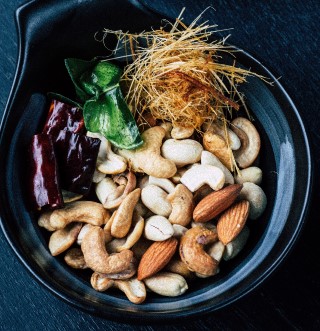
Mixed Nuts
Sleep promoter: melatonin, healthy fats, magnesium
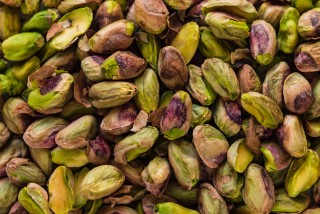
Pistachios
Sleep promoter: vitamin B

Kiwi
Sleep promoter: may be antioxidants or serotonin
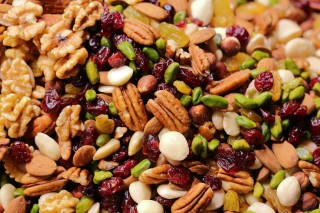
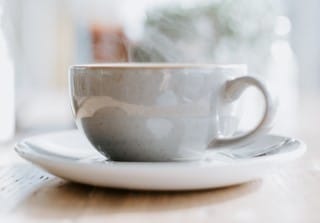
Warm Milk
Sleep promoter: calcium, tryptophan
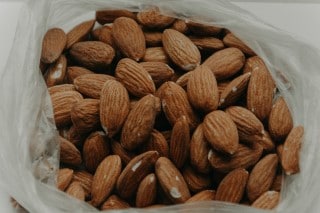
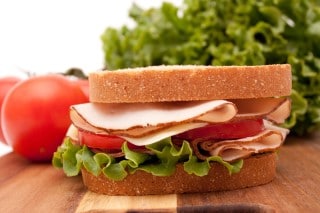
Lean turkey
Sleep promoter: tryptophan
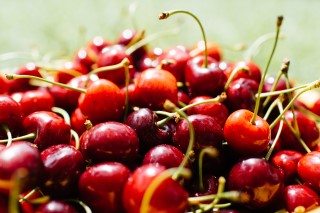
Tart Cherries or Cherry Juice
Sleep promoter: melatonin
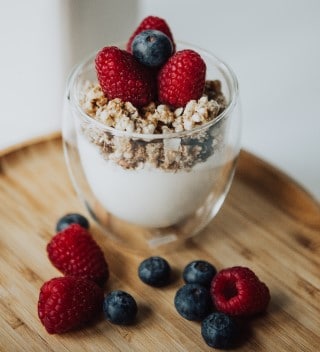
Yogurt with fruit and honey
Sleep promoter: calcium, magnesium, tryptophan, vitamin B
E) Diets that may help sleep apnea
Earlier I mentioned anti-inflammatory diets and how they may help sleep apnea patients.
There are other ways a specialized diet can help sleep apnea including weight loss, a known risk factor for sleep apnea. (That extra weight can fatten the neck area and obstruct breathing!)
And there are lots of diets to choose from – the Atkins Diet, Mediterranean diet, Nutritarian Diet, South Beach diet, Paleo diet, and many more.
Unfortunately, the health effects of these popular diets on sleep has not been well studied, except for a recent study in which the Mediterranean diet was found to help older adults sleep better.
Just keep in mind, what you want is a diet that:
- helps you lose weight
- rich in nutrients that support sleep and your sleep apnea treatment
- missing foods that can cause problems for sleep and sleep apnea
Power Up: Combine a Healthy Diet with Exercise
Many studies have shown that exercise promotes sleep. A recent study shows it can also reduce inflammation.
You may also be interested in:
Sleep apnea:
A quick explainer on sleep apnea
What’s the leading cause of sleep apnea?
Can losing weight help sleep apnea?
Sleep apnea and diet:
More about anti-inflammatory diets
A Beginner’s Guide to the Mediterranean Diet
More remedies for sleep apnea:
More natural remedies to help your sleep
Can acupuncture help sleep apnea?
Sources:
1. “Melatonin: In Depth”, NIH Website
2. Tryptophan Intake in the US Adult Population Is Not Related to Liver or Kidney Function but Is Associated with Depression and Sleep Outcomes, J Nutr. 2016, 146(12):2609S-2615S.
3. Effects of L-tryptophan on sleepiness and on sleep, J Psychiatr Res. 1982-1983, 17(2):107-13.
4. Sleep Symptoms Associated with Intake of Specific Dietary Nutrients, J Sleep Res. 2014, 23(1): 22–34.
5. The effect of magnesium supplementation on primary insomnia in elderly: A double-blind placebo-controlled clinical trial, J Res Med Sci. 2012, 17(12):1161-9.
6. Plasma pyridoxine deficiency is related to increased psychological distress in recently bereaved homosexual men, Psychosom Med. 1998, 60(3):297-308.
7. Comparison of nutrient intake by sleep status in selected adults in Mysore, India, Nutr Res Pract. 2011, 5(3): 230–235.
8. Sleep Apnea and Inflammation – Getting a Good Night’s Sleep with Omega-3 Supplementation, Front Neurol. 2013, 4: 193.
9. Upper airway and systemic inflammation in obstructive sleep apnoea, Eur Respir J. 2016, 48(4):1108-1117.
10. Honey and Health: A Review of Recent Clinical Research, Pharmacognosy Res. 2017, 9(2): 121–127.
11. Aged garlic extract supplementation modifies inflammation and immunity of adults with obesity: A randomized, double-blind, placebo-controlled clinical trial, Clin Nutr ESPEN. 2018, 24:148-155.
12. “Turmeric”, Arthritis Foundation website
13. Menthol inhibits oxidative stress and inflammation in acetic acid-induced colitis in rat colonic mucosa, Am J Transl Res. 2018, 10(12):4210–4222.
14. Alcohol and the risk of sleep apnoea: a systematic review and meta-analysis, Sleep Med. 2018, 42: 38–46.
15. Associations between the Mediterranean diet and sleep in older adults: Results from the Hellenic longitudinal investigation of aging and diet study, Geriatr Gerontol Int. 2018, 18(11):1543-1548.
Connect with us:
About Us
Better Sleep Simplified® was founded as a place for you to get clear and well-researched information.
Our goal is to make sure you know about your options so that you take action sooner rather than later.
Check us out on YouTube:
Watch and Learn
Helpful sleep tips, interesting sleep facts and statistics you want to know about
Affiliate Disclosure
This site is a participant in the Amazon Services LLC Associates Program and other affiliate advertising programs designed to provide a means for sites to earn advertising fees by advertising and linking to them.
Important: BetterSleepSimplified.com is for informational purposes only and is not intended or implied to be a substitute for professional medical advice, diagnosis, or treatment. Always consult a physician for sleep and health concerns. See additional information.
